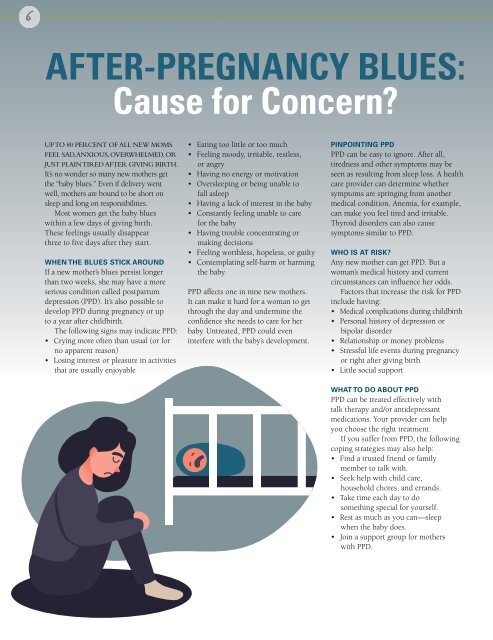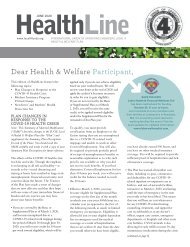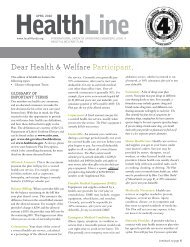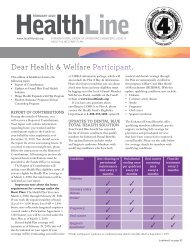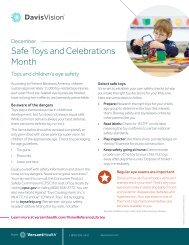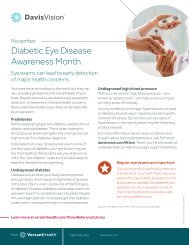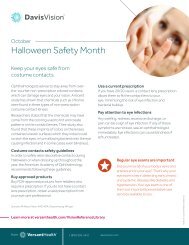You also want an ePaper? Increase the reach of your titles
YUMPU automatically turns print PDFs into web optimized ePapers that Google loves.
6<br />
AFTER-PREGNANCY BLUES:<br />
Cause for Concern?<br />
UP TO 80 PERCENT OF ALL NEW MOMS<br />
FEEL SAD, ANXIOUS, OVERWHELMED, OR<br />
JUST PLAIN TIRED AFTER GIVING BIRTH.<br />
It’s no wonder so many new mothers get<br />
the “baby blues.” Even if delivery went<br />
well, mothers are bound to be short on<br />
sleep and long on responsibilities.<br />
Most women get the baby blues<br />
within a few days of giving birth.<br />
These feelings usually disappear<br />
three to five days after they start.<br />
WHEN THE BLUES STICK AROUND<br />
If a new mother’s blues persist longer<br />
than two weeks, she may have a more<br />
serious condition called postpartum<br />
depression (PPD). It’s also possible to<br />
develop PPD during pregnancy or up<br />
to a year after childbirth.<br />
The following signs may indicate PPD:<br />
• Crying more often than usual (or for<br />
no apparent reason)<br />
• Losing interest or pleasure in activities<br />
that are usually enjoyable<br />
• Eating too little or too much<br />
• Feeling moody, irritable, restless,<br />
or angry<br />
• Having no energy or motivation<br />
• Oversleeping or being unable to<br />
fall asleep<br />
• Having a lack of interest in the baby<br />
• Constantly feeling unable to care<br />
for the baby<br />
• Having trouble concentrating or<br />
making decisions<br />
• Feeling worthless, hopeless, or guilty<br />
• Contemplating self-harm or harming<br />
the baby<br />
PPD affects one in nine new mothers.<br />
It can make it hard for a woman to get<br />
through the day and undermine the<br />
confidence she needs to care for her<br />
baby. Untreated, PPD could even<br />
interfere with the baby’s development.<br />
PINPOINTING PPD<br />
PPD can be easy to ignore. After all,<br />
tiredness and other symptoms may be<br />
seen as resulting from sleep loss. A health<br />
care provider can determine whether<br />
symptoms are springing from another<br />
medical condition. Anemia, for example,<br />
can make you feel tired and irritable.<br />
Thyroid disorders can also cause<br />
symptoms similar to PPD.<br />
WHO IS AT RISK?<br />
Any new mother can get PPD. But a<br />
woman’s medical history and current<br />
circumstances can influence her odds.<br />
Factors that increase the risk for PPD<br />
include having:<br />
• Medical complications during childbirth<br />
• Personal history of depression or<br />
bipolar disorder<br />
• Relationship or money problems<br />
• Stressful life events during pregnancy<br />
or right after giving birth<br />
• Little social support<br />
WHAT TO DO ABOUT PPD<br />
PPD can be treated effectively with<br />
talk therapy and/or antidepressant<br />
medications. Your provider can help<br />
you choose the right treatment.<br />
If you suffer from PPD, the following<br />
coping strategies may also help:<br />
• Find a trusted friend or family<br />
member to talk with.<br />
• Seek help with child care,<br />
household chores, and errands.<br />
• Take time each day to do<br />
something special for yourself.<br />
• Rest as much as you can—sleep<br />
when the baby does.<br />
• Join a support group for mothers<br />
with PPD.


